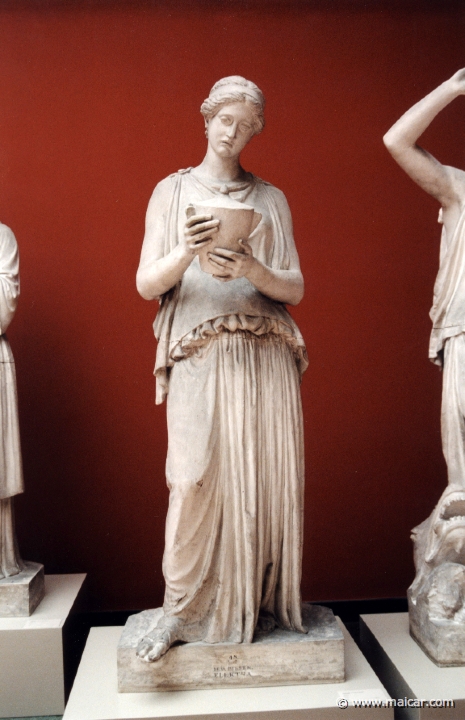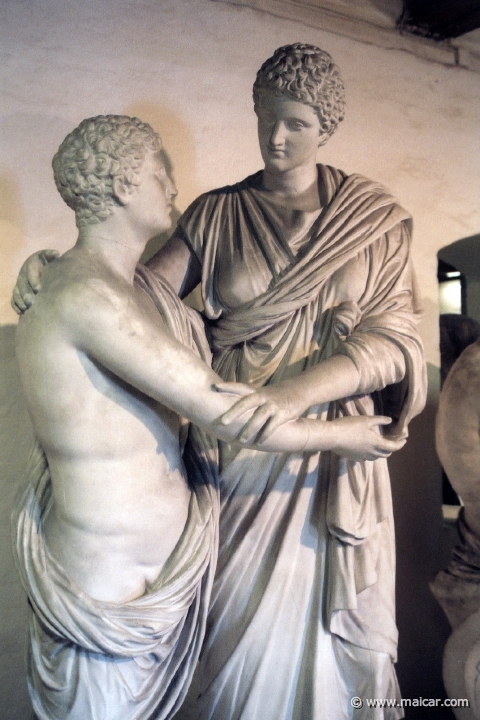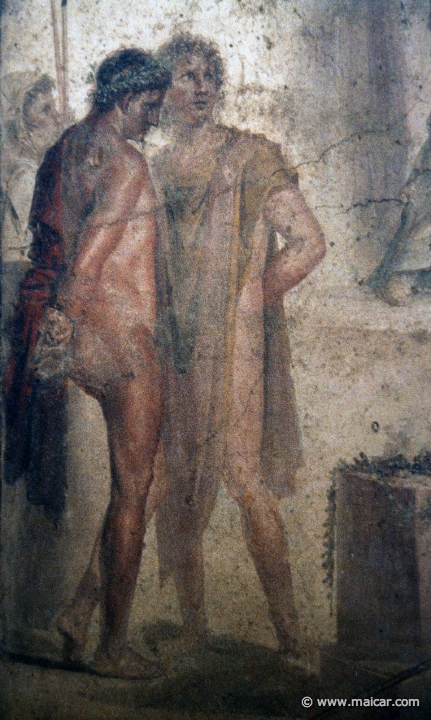|

|
Electra 2 holding the urn with the false ashes of her brother. 4916: Hermann Wilhelm Bissen 1798-1868: Electra, 1858. Ny Carlsberg Glyptotek, Copenhagen.
|
|
|
"O chariot-race of Pelops long ago, source of many a sorrow,
what disaster you have brought upon this land! For
ever since Myrtilus sank to rest beneath the waves,
hurled to utter destruction from his golden chariot
in disgraceful outrage, from that time to this,
outrage and its many sorrows were never yet gone
from this house." (Mycenaean women. Sophocles, Electra 504).
|
|
Electra 2 is mainly remembered for having waited for the return of her brother Orestes 2, hoping that
he would avenge their father
Agamemnon, who was
murdered, at his return from
Troy, by his own wife
Clytaemnestra and
her lover, the usurper
Aegisthus.
The problem with
Iphigenia at Aulis
King Agamemnon of
Mycenae did not prove to
be a loving father towards
Iphigenia. For he, caring more for the affairs of the state than for the life of his daughter, let her be sacrificed at Aulis, a Boeotian harbor, so that the fleet he commanded could finally sail to Troy. For this
army—that was determined to appear in front of
that city and obtain, through negotiation or by
force, the restoration of Helen and the Spartan
property that the seducer
Paris, guided by a goddess, had stolen—was now being detained by the will of another goddess, who would not grant favorable winds for the fleet to sail. And because of the winds and for the sake of
another woman, who was now at
Troy,
Iphigenia was killed,
some say. But others affirm that
Iphigenia, who perhaps
was Agamemnon's
stepdaughter, never perished at Aulis, and that
instead was saved by
Artemis (the goddess who
had stayed the winds), who took her to Tauris, a
coastal region in the Black Sea, today called
Crimea.
In any case, the Aulis affair, was neither
forgotten nor forgiven; and
Agamemnon's wife
Clytaemnestra, who
called Iphigenia her "sweet flower," did not wait for her husband, who many years later returned victorious from the Trojan War, with crown
or garland but with a two-edged sword, murdering
him as soon as he came into the palace, with the
help of her lover
Aegisthus, the king's
cousin.
Heir into exile
This was
Clytaemnestra's
revenge, and
Aegisthus' day of
glory. For he, through the assassination of his
cousin, believed to have put an end to the feud
started by their parents
Atreus and Thyestes 1, thereby gaining the throne of Mycenae for himself. But for Agamemnon's
children this was a sad and dangerous circumstance,
since they could not hope that the new king would
be well disposed towards the heirs of his enemy.
And as it became evident for them that
Aegisthus, fearing
Agamemnon's descent,
would try to kill the little prince
Orestes 2, he was smuggled out of the country, either by his sister Electra 2, or by some faithful servants, and brought to Phocis, in the region bordering the Gulf of Corinth west of
Boeotia.
The plight of Electra 2
But while Orestes 2 was raised in safety by his uncle Strophius 1 in Phocis, his sister Electra 2 stayed at home, sharing her life with her enemies. At the beginning, she was simply prevented by Aegisthus to marry,
lest she might have a son that would avenge
Agamemnon. But later—due to the fact that the fears felt by those who achieve their aims through murder have no limits—Aegisthus started shuddering at her possibly bearing a son in secret to a man of noble blood. To put an end to this apprehension, he planned then to murder Electra 2, but he was prevented by Clytaemnestra, who
wisely feared the hatred that such a deed would
arouse. This is why
Aegisthus, some say, conceived instead the idea of marrying Electra 2 to an insignificant man. For, he reasoned, a nobody would neither go stirring up old blood nor asking that the debt for Agamemnon's death
should be paid.
Clytaemnestra agreed to this arrangement; for, as it is said, women's love is for their lovers, not their children. And so Electra 2, some say, married a peasant who never touched her; but others affirm that she neither left the palace nor married anyone at that time. In any case, she never ceased to mourn her
father, and having no offspring of her own, she
hoped, during several years, for the return of her
brother Orestes 2. And
as she cherished that hope, she let her hate grow
against her adulterous mother, and against the
tyrant who usurped her father's throne and bed. And
by never putting an end to her lamentations, she
poisoned the nights and days of those who had
vanquished Agamemnon,
and were now king and queen, destroying the
enjoyment of their splendor, and calling upon them
the powers and curses of the
Underworld:
"O House of Hades and Persephone! O Hermes of the shades! O potent Curse, and
you fearsome daughters of the gods, the
Erinyes, who take note when a life is
unjustly taken, when a marriage-bed is thievishly
dishonored, come, help me, bring vengeance for the
murder of my father and send me my brother." (Electra 2. Sophocles, Electra 110).
This is why her mother, who could not find peace
in the midst of so much mourning, reproached her:
"Wicked and
hateful girl, have you alone lost your father, and
is no one else in the world grieving? May your
death be harsh, and may the gods below never free
you from your current mourning." (Clytaemnestra to Electra 2. Sophocles, Electra 290).
Vengeance nourished with grief
Electra 2 had no consolation during these years, when she ceaselessly mourned her father while seeing herself as the child of a wretched mother. And although all know that neither weeping nor prayer can resurrect anybody, Electra 2 spent her days bathing in tears, and treading with unwearied determination on the path of sorrows. Yet she did not cherish pain for its own sake, but because she knew that vengeance is best nourished with deep grief. And as revenge would follow the steps of Orestes 2, she added to
her grief limitless longing for her brother.
Rejects comfort
Such was Electra 2's determination: to live in grief and longing, and wait for vengeance to replace them. That is why she found no consolation in such words as:
"Not to you alone of mortals … has sorrow come …" (Mycenaean women to Electra 2. Sophocles, Electra 110).
Instead her grief and longing were her only
comfort and hope in the palace, where she lived as
a slave:
"I waste away
without children and have no loving husband to
champion me, but like some despised foreign slave,
I serve in the halls of my father, wrapped in
shabby garments and standing to eat scanty
meals." (Electra 2 to the Mycenaean women. Sophocles, Electra 190).
She was hated for her ceaseless wailing. But by
exercising her talent in achieving misfortune, she
succeeded in breeding wars in the depth of her
heart against the murderers of her father. And from
those wars she expected relief; that is why she
says:
"Let me be,
let me be, my comforters!" (Electra 2 to the Mycenaean women. Sophocles, Electra 229).
|

|
Orestes 2 and Electra 2. 8714: 'Orestes og Elektra' fundet 1623. Menelaos, Romersk 1. årh. f./e. Kr. Rom, Museo Nazionale Romano (Royal Cast Collection, Copenhagen).
|
|
Grief nourished with the hope of vengeance
For he who knows the cause of his own wailing
and deems to have been forced into it, neither
wishes any respite from his pains nor to restrain
his cries, but to confront compulsion with a
greater force when Time,
who "… purges all things …" (Aeschylus, Eumenides 285). comes. In the meanwhile, mourning her father is the proper way of waiting, and honouring the heart's desire:
"For if the
dead is to lie a wretch, merely dust and
nothingness, while his slayers do not pay back to
him blood for blood in penalty, then shame and
reverence will vanish from all humanity." (Electra 2 to the Mycenaean women. Sophocles, Electra 244).
And to mourning Electra 2 added indignation on account of the scandal that wrapped the rulers of the palace, letting herself be utterly disgusted when she saw Aegisthus
sitting on her father's throne, and wearing
Agamemnon's robes. But
the chief outrage was, as she put it, to see
"… the murderer in my father's bed at my wretched mother's side …" (Electra 2 to the Mycenaean women. Sophocles, Electra 266).
For whereas
Clytaemnestra
regarded the murder of
Agamemnon as an act of deliverance, Electra 2 considered it as a treacherous deed performed by a depraved wife and a polluted usurper. These in turn, having grown weary of so much mourning, had decided to imprison her beyond the land's borders, if Electra 2 refused to cease complaining. "Unjust complaints," Clytaemnestra thought, for the father whom she constantly bewailed had at Aulis sacrificed Electra 2's own sister. But this was not an argument that could estrange Electra 2 from her father's memory.
For according to her, the unhappy situation that forced her father to sacrifice Iphigenia against his
will had been caused by a goddess, and it had been,
she said, under fierce constraint that
Agamemnon at last
sacrificed her.
Smuggling in and out
It is to these dire straits that
Orestes 2, long awaited
with hope by his sister, and with fear by the
others, finally approached with his friend Pylades.
Yet he did not come blowing a trumpet at the gates
of Mycenae, but instead
he sent, as some say, a messenger to the palace to
announce his death, supposedly occurred in the
course of a contest at
Delphi. And in order to
disperse any doubts, he came later himself
disguised as a Phocian man, carrying a bronze urn,
said to be filled with his own dust. This is how
Orestes 2, who once had
been smuggled out of the palace, now smuggled
himself into it again.
Good or bad news?
When
Clytaemnestra
heard the news, she did not know whether to call
them fortunate or terrible. For knowing that
Orestes 2 would come
some day to avenge his father, she now had to
rejoice at her own misery, and regard the death of
her child as the lucky circumstance which would
preserve her own life. So watching the dissociation
of her own soul she reflected:
"There is a
terrible power in motherhood; a mother may be
wronged, but she can feel no hate for those whom
she bore." (Clytaemnestra to
the messengers. Sophocles,
Electra 770).
For often had Orestes 2 from his exile charged his mother with murder
and made terrible threats, filling her heart with
fear, and making Sleep desert her. That is why she felt that from now on she could live her days in peace. But for Electra 2 no champion remained, and seeing herself alone, except for her weak sister Chrysothemis 1, she decided to slay Aegisthus with her own
hands.
Vengeance accomplished
|

|
Orestes 2 and Pylades. 7125: Orestes and Pylades. Pompei, casa del Citarista. National Archaeological Museum, Naples.
|
|
It was then that Orestes 2 appeared in front of his sister; and he and
Pylades, carrying the urn, came into the palace,
and slew
Clytaemnestra. And when Electra 2 heard her wounded mother crying, she exclaimed:
"Stab her
doubly, if you can!" (Electra 2. Sophocles, Electra 770).
Later arrived
Aegisthus; and she
guided him so that he would meet the messengers
with the urn, who being his bane, slew him too.
Details, which usually proliferate in all circumstances, are different in other accounts (see Orestes 2). But despite details, all remember Electra 2 as the courageous girl, who through love of her father and brother, spent years nourishing, with woe and longing, the vengeance that would fall upon her mother, whom she detested, and upon the usurper, whom she despised.
Condemned to death
After the deaths of
Aegisthus and
Clytaemnestra, the
throne of Mycenae did
not immediately revert to
Orestes 2, since he,
being pursued by the
ERINYES of his mother, went mad. Besides, the two siblings were tried by the full court of the Argive people, who found them guilty of matricide, and voted to condemn them to die, leaving them the choice to hang themselves, or to use a sword, or to be killed by someone appointed by the citizens. However, in order to escape this doom, they
decided, on account of
Menelaus' reluctance to
protect his nephew and niece, to kill
Helen, and by Electra 2's advice, to take Hermione as a
hostage, and threat to kill her if
Menelaus would dare to
make any move after
Helen's death. The plot failed, but the divine intervention it caused protected them (see Orestes 2).
Aegisthus' son
While Orestes 2 was away purging his crime in various weird ways, a false messenger came to Electra 2 in Mycenae saying that
Orestes 2 and Pylades had been sacrificed in Tauris. It was then that Aletes 1, son of Aegisthus and
Clytaemnestra,
hearing that the family of the Atrides was extinct,
seized power in Mycenae, and Electra 2 became once again the subject of an usurper, now her own half-brother. Electra 2 then, accompanied by the messenger, traveled to Delphi in
order to inquire about her brother's death, and
happened to arrive the same day that
Iphigenia and
Orestes 2 returned from
Tauris. When the sisters met, the false messenger
said that Iphigenia was the murderess of her brother. So Electra 2 seized a burning firebrand from the altar, and would have blinded her if Orestes 2 had not appeared and intervened.
Married to an ally and loyal friend
Now Orestes 2 was cured, and after killing Aletes 1, he became ruler of a vaster kingdom than his father's, marrying Electra 2 to his loyal friend Pylades, who remained an ally. Nothing has been reported about the sons of Electra 2 and Pylades, nor about her death.
Others with identical name
Electra 1 is one of the OCEANIDS. Electra 3 is one of the PLEIADES. Electra 4 is one of the DANAIDS. Electra 5 was a maid of Helen.
|